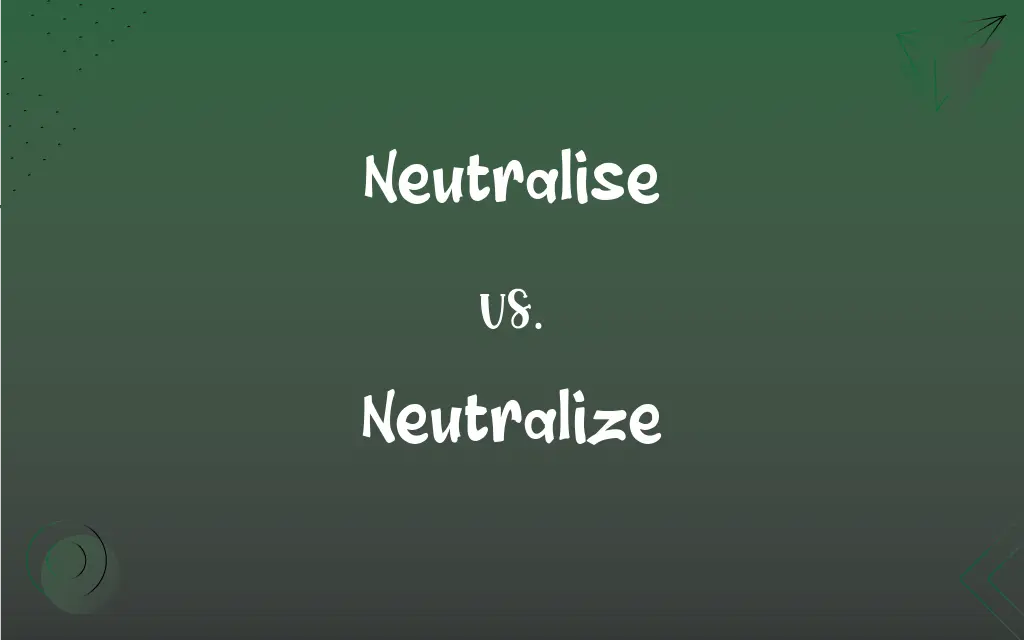Neutralise vs. Neutralize: What's the Difference?
Edited by Harlon Moss || By Janet White || Updated on November 30, 2023
"Neutralise" and "neutralize" have the same meaning: to make something ineffective or to counteract its effects, but "neutralise" is the British spelling, while "neutralize" is the American spelling.

Key Differences
Neutralise, the British English spelling, means to render something harmless or ineffective. Neutralize, with its American English spelling, carries the same meaning, signifying the act of counteracting or nullifying something's effect.
Neutralise is commonly used in scientific contexts, like chemistry, to describe the process of making acids or alkalis chemically neutral. Neutralize, spelled with a 'z', is used in similar contexts in American English, representing the same chemical process.
The term neutralise can also imply reducing a threat or conflict in political or military contexts. Similarly, neutralize, in American English, is used to indicate making a threat or opposition ineffective.
In everyday language, to neutralise can mean to counterbalance or cancel out any effect or force. Neutralize, following the American English convention, holds the same connotation of balancing or negating an influence or power.
Neutralise, in British English, extends to metaphorical uses, such as neutralising an argument or dispute. The American English variant, neutralize, is similarly employed in various fields to denote rendering something neutral or ineffective.
ADVERTISEMENT
Comparison Chart
Spelling
Neutralise
Neutralize
Usage in Science
Common in British scientific literature
Common in American scientific literature
Political/Military Usage
Used to indicate making threats harmless
Used similarly in American contexts
Everyday Language
Used to imply balancing or negating
Same usage in American English
Metaphorical Applications
Used in various contexts to negate effects
Similar applications in American English
ADVERTISEMENT
Neutralise and Neutralize Definitions
Neutralise
To counteract the effects of an acid or alkali.
Adding baking soda will neutralise the acid.
Neutralize
To counteract the effects of an acid or alkali.
Limestone is used to neutralize acidic soil.
Neutralise
To make something ineffective or harmless.
The antidote will neutralise the poison.
Neutralize
To make something chemically neutral.
A base was added to neutralize the solution.
Neutralise
To balance or cancel out an effect or force.
The counterweight will neutralise the load's imbalance.
Neutralize
To render an opponent or threat ineffective.
The strategy was designed to neutralize the adversary.
Neutralise
To make something chemically neutral.
The treatment will neutralise the contaminated water.
Neutralize
To balance or cancel out an effect or force.
The system will neutralize the electrical surge.
Neutralise
To render an opponent or threat ineffective.
Diplomacy helped to neutralise the conflict.
Neutralize
To make something ineffective or harmless.
The vaccine will neutralize the virus's impact.
Neutralise
(British spelling) neutralize
Neutralize
To make neutral.
Neutralise
Get rid of (someone who may be a threat) by killing;
The mafia liquidated the informer
The double agent was neutralized
Neutralize
To counterbalance or counteract the effect of; render ineffective.
Neutralise
Make incapable of military action
Neutralise
Make ineffective by counterbalancing the effect of;
Her optimism neutralizes his gloom
This action will negate the effect of my efforts
Neutralise
Make chemically neutral;
She neutralized the solution
FAQs
Can neutralise be used in a military context?
Yes, it can mean to render a threat or force ineffective in a military context.
What does neutralize mean?
Neutralize has the same meaning as neutralise, to render something ineffective or harmless.
How do you spell neutralize in American English?
In American English, it is spelled as 'neutralize.'
Can neutralise be used in everyday language?
Yes, it can be used to mean counterbalancing or negating an effect in everyday language.
What does neutralise mean?
Neutralise means to make something ineffective or harmless.
Is neutralize commonly used in American scientific literature?
Yes, it's commonly used in American English, especially in scientific contexts.
Is there a difference in meaning between neutralise and neutralize?
No, they have the same meaning but different spellings based on British and American English.
What is an example of neutralising an acid?
Adding a base like baking soda to vinegar is an example of neutralising an acid.
Is neutralize used in political contexts in the US?
Yes, in the US, it's used in political or military contexts to indicate making threats harmless.
Do neutralise and neutralize have the same pronunciation?
Yes, they are pronounced the same way.
What is the American English variant of neutralise?
The American English variant is 'neutralize.'
Do neutralise and neutralize have the same grammatical usage?
Yes, they are used the same way grammatically in sentences.
How do you spell neutralise in British English?
In British English, it is spelled as 'neutralise.'
Can neutralise be used metaphorically?
Yes, it can be used metaphorically to indicate making an argument or effect ineffective.
Are neutralise and neutralize interchangeable?
Yes, they are interchangeable, with the choice of spelling depending on the variant of English being used.
Can neutralize be used in a legal context?
Yes, it can be used to mean making a legal threat or challenge ineffective.
What is the British English variant of neutralize?
The British English variant is 'neutralise.'
Is neutralize used in environmental contexts?
Yes, it can be used in environmental contexts, like neutralizing pollutants.
Can neutralise be used in a psychological context?
Yes, it can be used to mean making an emotional response or trauma ineffective.
Is neutralize used in medical contexts in the US?
Yes, it's used in medical contexts to indicate making a pathogen or toxin harmless.
About Author
Written by
Janet WhiteJanet White has been an esteemed writer and blogger for Difference Wiki. Holding a Master's degree in Science and Medical Journalism from the prestigious Boston University, she has consistently demonstrated her expertise and passion for her field. When she's not immersed in her work, Janet relishes her time exercising, delving into a good book, and cherishing moments with friends and family.
Edited by
Harlon MossHarlon is a seasoned quality moderator and accomplished content writer for Difference Wiki. An alumnus of the prestigious University of California, he earned his degree in Computer Science. Leveraging his academic background, Harlon brings a meticulous and informed perspective to his work, ensuring content accuracy and excellence.































































